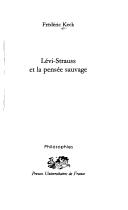| Listing 1 - 10 of 335 | << page >> |
Sort by
|

ISBN: 3859771892 Year: 1992 Publisher: Basel Museum der Kulturen
Abstract | Keywords | Export | Availability | Bookmark
 Loading...
Loading...Choose an application
- Reference Manager
- EndNote
- RefWorks (Direct export to RefWorks)
History of civilization --- illness --- Papua New Guinea --- Medical anthropology --- Traditional medicine --- Yupna (Papua New Guinean people) --- Medicine, Traditional --- Diseases. --- Medicine. --- Social conditions.

ISBN: 2130535836 9782130535836 Year: 2004 Volume: 179 Publisher: Paris : PUF - Presses Universitaires de France,
Abstract | Keywords | Export | Availability | Bookmark
 Loading...
Loading...Choose an application
- Reference Manager
- EndNote
- RefWorks (Direct export to RefWorks)
Ethnology --- Ethnologists --- Totemism --- Anthropologie sociale et culturelle --- Ethnologues --- Totémisme --- Lévi-Strauss, Claude --- Totémisme --- Lévi-Strauss, Claude --- Lévi-Strauss, Claude.
Book
ISSN: 12485284 ISBN: 9782271066527 2271066522 2271078091 Year: 2008 Publisher: Paris : CNRS Editions,
Abstract | Keywords | Export | Availability | Bookmark
 Loading...
Loading...Choose an application
- Reference Manager
- EndNote
- RefWorks (Direct export to RefWorks)
En quoi consiste le « primitif » n’est-il pas un succédané de l’enfant, du rêveur ou du criminel auxquels veulent le cantonner les défenseurs de la « civilisation » ? Comment comprendre que les Bororo puissent dire qu’ils sont des oiseaux Arara ? C’est la question que pose Lévy-Bruhl dans la Mentalité primitive en 1922. Cet historien de la philosophie, spécialiste des transferts culturels entre la France et l’Allemagne, intervient ainsi, au croisement de la philosophie, de l’anthropologie, de la psychologie et de la sociologie dans le contexte des sciences humaines alors naissantes et déjà rivales. Aujourd’hui, ses travaux continuent d’alimenter les débats entre le structuralisme, la philosophie analytique et la phénoménologie. Qu’est ce qui fonde, dans l’esprit humain, le principe de contradiction ? À quoi tiennent les sentiments et des croyances qui font percevoir un être naturel comme un être social ? Qu’est-ce qui rend possible la participation immédiate et affective au monde ? Voici enfin redécouvert un pan considérable de l’histoire de la pensée, qui lie le XIXe au XXe siècle, et qui permet de relire autrement Durkheim, Bergson, Lévi-Strauss.
Anthropology --- Primitive societies. --- Ethnopsychology. --- Anthropologie --- Homme primitif --- Ethnopsychologie --- Philosophy. --- Philosophie --- Lévy-Bruhl, Lucien, --- Primitive societies --- Ethnopsychology --- Philosophy --- Lévy-Bruhl, Lucien, --- Anthropology - Philosophy --- Lévy-Bruhl, Lucien, - 1857-1939 --- mentalité primitive --- primitif --- expérience anthropologique --- ethnographie --- surnaturel --- Prehistoric peoples. --- Sociétés préhistoriques --- Lévy-Bruhl, Lucien (1857-1939) --- Primitivisme --- Société primitive --- Contradiction --- Évolutionnisme --- Critique et interprétation
Book
ISBN: 9782081241770 2081241773 Year: 2010 Publisher: [Paris] : Flammarion,
Abstract | Keywords | Export | Availability | Bookmark
 Loading...
Loading...Choose an application
- Reference Manager
- EndNote
- RefWorks (Direct export to RefWorks)
Influenza --- Disease management. --- Human-animal relationships. --- Grippe --- Gestion thérapeutique --- Relations homme-animal --- Epidemiology. --- Epidémiologie --- Disease management --- Human-animal relationships --- Epidemiology --- Gestion thérapeutique --- Epidémiologie --- Grippe aviaire --- Grippe porcine --- Politique sanitaire --- Prévention --- Études transculturelles --- Aspect social --- Études transculturelles. --- Influenza - Epidemiology
Book
ISBN: 3460210516 9783460210516 Year: 1976 Volume: 25 Publisher: Stuttgart Katholisches Bibelwerk
Abstract | Keywords | Export | Availability | Bookmark
 Loading...
Loading...Choose an application
- Reference Manager
- EndNote
- RefWorks (Direct export to RefWorks)
Bible. --- Criticism, interpretation, etc. --- Bible --- Criticism, interpretation, etc --- 226.4 --- #GROL:SEMI-22<08> Fobi 25 --- Evangelie volgens Lucas
Book
ISBN: 9782266210713 2266210718 Year: 2011 Volume: 282 Publisher: [Paris] : Pocket - la Découverte,
Abstract | Keywords | Export | Availability | Bookmark
 Loading...
Loading...Choose an application
- Reference Manager
- EndNote
- RefWorks (Direct export to RefWorks)

ISBN: 0195110978 9780195110975 Year: 1998 Publisher: Oxford [etc.] : Oxford University Press,
Abstract | Keywords | Export | Availability | Bookmark
 Loading...
Loading...Choose an application
- Reference Manager
- EndNote
- RefWorks (Direct export to RefWorks)
Recently angels have made a remarkable comeback in the popular imagination; their real heyday, however, was the Middle Ages. From the great shrines dedicated to Michael the Archangel at Mont-St-Michel and Monte Garano to the elaborate metaphysical speculations of the great thirteenth-century scholastics, angels dominated the physical, temporal, and intellectual landscape of the medieval West. This book offers a full-scale study of angels and angelology in the Middle Ages. Seeking to discover how and why angels became so important in medieval society, David Keck considers a wide range of fascinating questions such as: Why do angels appear on baptismal fonts? How and why did angels become normative for certain members of the church? How did they become a required course of study? Did popular beliefs about angels diverge from the angelologies of the theologians? Why did some heretics claim to derive their authority from heavenly spirits? Keck spreads his net wide in the attempt to catch traces of angels and angelic beliefs in as many portions of the medieval world as possible. Metaphysics and mystery plays, prayers and pilgrimages, Cathars and cathedrals-all these and many more disparate sources taken together reveal a society deeply engaged with angels on all its levels and in some unlikely ways.
Angels --- Christianity --- History of doctrines --- Cult. --- Cult --- Anges --- Biblical teaching --- Bible --- Angels - Christianity - History of doctrines - Middle Ages, 600-1500 --- Angels - Cult --- Moyen Age --- MEDIEVAL CIVILIZATION --- ANGELS --- HISTORY OF DOCTRINES --- MIDDLE AGES, 600-1500
Book
ISBN: 3319982494 3319982486 Year: 2018 Publisher: Cham : Springer International Publishing : Imprint: Springer,
Abstract | Keywords | Export | Availability | Bookmark
 Loading...
Loading...Choose an application
- Reference Manager
- EndNote
- RefWorks (Direct export to RefWorks)
This book explores how machine learning can be used to improve the efficiency of expensive fundamental science experiments. The first part introduces the Belle and Belle II experiments, providing a detailed description of the Belle to Belle II data conversion tool, currently used by many analysts. The second part covers machine learning in high-energy physics, discussing the Belle II machine learning infrastructure and selected algorithms in detail. Furthermore, it examines several machine learning techniques that can be used to control and reduce systematic uncertainties. The third part investigates the important exclusive B tagging technique, unique to physics experiments operating at the Υ resonances, and studies in-depth the novel Full Event Interpretation algorithm, which doubles the maximum tag-side efficiency of its predecessor. The fourth part presents a complete measurement of the branching fraction of the rare leptonic B decay “B→tau nu”, which is used to validate the algorithms discussed in previous parts.
Artificial intelligence. --- Particles (Nuclear physics) --- Elementary particles (Physics) --- High energy physics --- Nuclear particles --- Nucleons --- Nuclear physics --- AI (Artificial intelligence) --- Artificial thinking --- Electronic brains --- Intellectronics --- Intelligence, Artificial --- Intelligent machines --- Machine intelligence --- Thinking, Artificial --- Bionics --- Cognitive science --- Digital computer simulation --- Electronic data processing --- Logic machines --- Machine theory --- Self-organizing systems --- Simulation methods --- Fifth generation computers --- Neural computers --- Computer simulation. --- Quantum theory. --- Elementary Particles, Quantum Field Theory. --- Artificial Intelligence. --- Data-driven Science, Modeling and Theory Building. --- Measurement Science and Instrumentation. --- Quantum dynamics --- Quantum mechanics --- Quantum physics --- Physics --- Mechanics --- Thermodynamics --- Elementary particles (Physics). --- Quantum field theory. --- Sociophysics. --- Econophysics. --- Physical measurements. --- Measurement . --- Measuring --- Mensuration --- Mathematics --- Technology --- Metrology --- Physical measurements --- Measurements, Physical --- Mathematical physics --- Measurement --- Economics --- Statistical physics --- Mathematical sociology --- Relativistic quantum field theory --- Field theory (Physics) --- Quantum theory --- Relativity (Physics) --- Statistical methods
Book
ISBN: 3662536285 Year: 2017 Publisher: Berlin, Heidelberg : Springer Berlin Heidelberg : Imprint: Springer Gabler,
Abstract | Keywords | Export | Availability | Bookmark
 Loading...
Loading...Choose an application
- Reference Manager
- EndNote
- RefWorks (Direct export to RefWorks)
Neun von zehn Unternehmen sind Kleinstunternehmen mit weniger als zehn Beschäftigten. Dieses Buch zeigt, das CSR-Management und Nachhaltigkeitsorientierung nicht nur ein Thema für Großunternehmen ist. Auch Kleinst- bzw. Ein-Personen-Unternehmen profitieren von der strategischen Verankerung von CSR im Kerngeschäft. Bekannte Experten bringen in diesem Buch globale CSR- und Nachhaltigkeitsanforderungen näher an Kleinstunternehmen heran und eröffnen den Diskurs an der Basis unserer mittelständischen Wirtschaft. Das Buch zeigt Erfolgsmodelle für gewinnbringende CSR-Aktivitäten bei Kleinstunternehmen auf. Durch inspirierende Praxisbeispiele wird die eigene Innovationskraft angeregt. Das Buch eignet sich für Inhaber von Kleinstunternehmen und Gründungsinteressierte. Gleichzeitig unterstützt es eine an Nachhaltigkeitsförderung ausgerichtete Wirtschaftspolitik. Wolfgang Keck ist einer der Vorreiter in der Diskussion um Corporate Social Responsibility in kleinen und mittleren Unternehmen und bricht die Thematik mit der vorliegenden Publikation erstmals auf die kleinsten Wirtschaftseinheiten herunter. Der Inhalt - Kleinst- und Ein-Personen-Unternehmen stärker im CSR-Diskurs wahrnehmen - Kleinstunternehmen verstehen und Nachhaltigkeitsorientierung fördern - CSR als unternehmerische Zukunftsstrategie verständlich und nutzbar gestalten Der Herausgeber Wolfgang Keck ist Autor, Dozent und Projektleiter für Corporate Social Responsibility in kleinen und mittleren Unternehmen. Er arbeitet freiberuflich von Berlin aus und in Teilzeit bei der GILDE-Wirtschaftsförderung in Detmold. Die Reihe "In der CSR-Managementreihe werden bestehende Ansätze durch neue Ideen und Konzepte ergänzt, um so dem Paradigma eines nachhaltigen Managements gerecht zu werden. Damit soll ein neuer Standard in der unternehmerischen Praxis sowie Managementliteratur gesetzt werden." (René Schmidpeter).
Business ethics. --- Entrepreneurship. --- Business Ethics. --- Entrepreneur --- Intrapreneur --- Capitalism --- Business incubators --- Business --- Businesspeople --- Commercial ethics --- Corporate ethics --- Corporation ethics --- Professional ethics --- Wealth --- Moral and ethical aspects --- Economics --- Economic theory --- Political economy --- Social sciences --- Economic man

ISBN: 1280453370 0195354966 0585182760 9780585182766 9780195354966 9780195110975 0195110978 9781280453373 9786610453375 6610453373 0195110978 0197738206 Year: 1998 Publisher: New York : Oxford University Press,
Abstract | Keywords | Export | Availability | Bookmark
 Loading...
Loading...Choose an application
- Reference Manager
- EndNote
- RefWorks (Direct export to RefWorks)
Angels have made a remarkable comeback in the popular imagination; their real heyday, however, was the Middle Ages. This text offers a study of angels and angelology in the Middle Ages, seeking to discover how and why angels became so important in medieval society.
Angels --- Cult of angels --- Invocation of angels --- Veneration of angels --- Worship of angels --- Cults --- Angelology --- Cherubim --- Cherubs (Spirits) --- Divine messengers --- Seraphim --- Spirits --- History of doctrines --- Cult. --- Cultus
| Listing 1 - 10 of 335 | << page >> |
Sort by
|

 Search
Search Feedback
Feedback About UniCat
About UniCat  Help
Help News
News